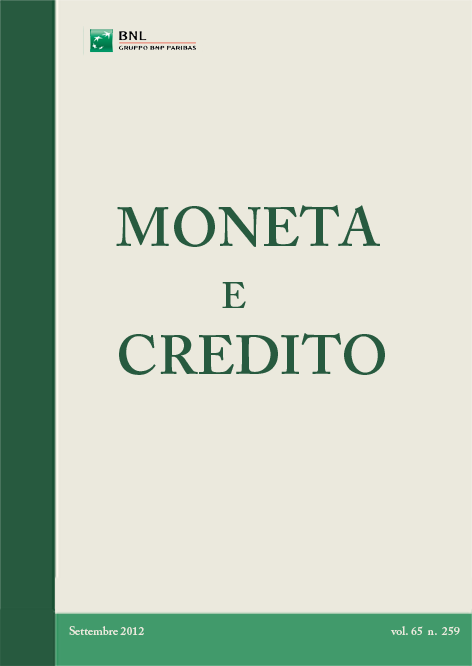Introduzione: la ritirata del neoliberismo?(Introduction: The Retreat of Neo-Liberalism?)
DOI:
https://doi.org/10.13133/2037-3651/10136Parole chiave:
Introduction, euro, crisis, neoliberalismAbstract
L'articolo introduce il nuovo numero della rivista.Discute quali ragioni possono spiegare il fatto che le misure di austerità sono sempre più criticate da un vasto numero di economisti mentre sono ancora sostenute da tutte le istituzioni dell'UE.È qui suggerito che la posizione neoliberale sembra essersi gradualmente spostata dal dibattito economico per passare a un livello moralistico e giuridico, incentrato sulla legittimità formale (all'interno di una determinata configurazione istituzionale) delle alternative politiche proposte per affrontare la crisi dell'eurotrascurando e astenendo dal criticare il loro fondamento logico.Questo "ritiro" consente alle defunte teorie economiche di dominare ancora il dibattito politico.
The article introduces the new issue of the journal. It discusses what reasons may explain the fact that austerity measures are increasingly criticised by vast numbers of economists while they are still endorsed by all EU institutions. It is here suggested that the neoliberal stance seem to have gradually shifted away from the economic debate to move to a moralistic and a juridical level, focussed on the formal legitimacy (within the given institutional setup) of the proposed policy alternatives to tackle the euro crisis while neglecting and abstaining from criticising their underlying rationale. This ‘retreat’ allows for defunct economic theories to still dominate the political debate.
JEL: F33, B50, E12
Riferimenti bibliografici
ALESINA A. e GIAVAZZI F. (2008), "La crisi: può la politica salvare il mondo?", Il Saggiatore, Milano.
BBC NEWS (2012), "Merkel: Eurozone Must Avoid Greek Exit", intervista del 26 marzo 2012, disponibile online alla URL http://www.bbc.co.uk/news/world-europe-17497656.
CELLINI R. (2012), "Su che cos’è l’economia politica", Moneta e Credito, vol. 65 n. 259, pp. 213-228.
CESARATTO (2012), "Note bibliografiche", Moneta e Credito, vol. 65 n. 259, pp. 269-272.
CICCONE R. (2012), "Pierangelo Garegnani: rifondare la teoria economica", Moneta e Credito, vol. 65 n. 259, pp. 243-267.
D’IPPOLITI C. (2012), "Crisi: (come) ne usciamo?", L’asino d’oro, Roma.
D’IPPOLITI C. e RONCAGLIA A. (2011), "L’Italia: una crisi nella crisi", Moneta e Credito, vol. 64 n. 255, pp. 189-227.
DE GRAUWE, P. (2011), "The Governance of a Fragile Eurozone", CEPS Working Documents, Economic Policy, n. 346, maggio.
FARRELL H. e QUIGGIN J. (2012), "Consensus, Dissensus and Economic Ideas: The Rise and Fall of Keynesianism During the Economic Crisis", mimeo, 9 marzo 2012.
GUEROT E. (2012), "The Euro Debate in Germany: Towards Political Union?", Social Europe Journal, 6 settembre 2012. Disponibile online alla URL http://www.social-europe.eu/2012/09/the-euro-debate-in-germany-towards-political-union/.
HEIN E. (2012), "Finance-Dominated Capitalism, Re-Distribution, Household Debt and Financial Fragility in a Kaleckian Distribution and Growth Model", PSL Quarterly Review, vol. 65 n. 260, pp. 12-51.
KEAY D. (1987), "Interview for ‘Woman’s Own’", Thatcher Archive, COI transcript, 23 settembre. Disponibile online alla URL http://www.margaretthatcher.org/ document/106689.
KODRES L. (2008), "A Crisis of Confidence… and a Lot More", Finance & Development, vol. 45 n. 2, Fondo Monetario Internazionale, Washington (DC). Disponibile online alla URL http://www.imf.org/external/pubs/ft/fandd/2008/06/kodres.htm
KÖSTERS W. (2009), "Common Euro Bonds – No Appropriate Instrument", Intereconomics – Review of European Economic Policy, maggio/giugno, pp. 135-138.
KREGEL J. (2011), "Uscire dalla crisi finanziaria statunitense: la politica domina l’economia nella Nuova Economia Politica", Moneta e Credito, vol. 64 n. 253, pp. 15-30.
KRUGMAN P. (2009), "Il ritorno dell’economia della depressione e la crisi del 2008", Garzanti, Milano.
MONTESANO A. (2012), "Origine e struttura dell’economia politica", Moneta e Credito, vol. 65 n. 259, pp. 193-212.
RONCAGLIA A. (2009), "Keynes and Probability: An Assessment", European Journal of the History of Economic Thought, vol. 16 n. 3, pp. 489-510.
RONCAGLIA A. (2012), "Economia politica: impostazioni a confronto", Moneta e Credito, vol. 65 n. 259, pp. 229-241.
SOROS G. (2008), "Cattiva finanza", Fazi Editore, Roma.
STIGLITZ J. (2010), "Freefall: America, Free Markets, and the Sinking of the World Economy", W.W. Norton, New York.
SYLOS LABINI P. (2009), "Le prospettive dell’economia mondiale", Moneta e Credito, vol. 62 n. 245-248, pp. 61-89.
THOMSON R., KARNITSCHNIG M. e BLACKSTONE B. (2012), "Interview with Mario Draghi, President of the ECB", The Wall Street Journal, 24 febbraio.
TONVERONACHI M. (2010), "Empowering Supervisors with More Principles and Discretion to Implement Them Will Not Reduce the Dangers of the Prudential Approach to Financial Regulation", PSL Quarterly Review, vol. 63 n. 255, pp. 363-378.
WEIDMANN J. (2012), "Too Close to State Financing Via the Money Press", Der Spiegel, International online edition, 29 agosto 2012. Disponibile online alla URL http://www.spiegel.de/international/europe/spiegel-interview-with-bundesbank-president-jens-weidmann-a-852285.html.
##submission.downloads##
Fascicolo
Sezione
Licenza

Ogni materiale pubblicato sul sito e gli articoli pubblicati sulla rivista sono distribuiti con Licenza internazionale Creative Commons Attribuzione - Non commerciale - Non opere derivate 4.0. Copia della licenza è disponibile alla URL http://creativecommons.org/licenses/by-nc-nd/4.0. Gli autori mantengono i diritti sulla loro opera e cedono alla rivista il diritto di prima pubblicazione dell'opera con la licenza suindicata.


